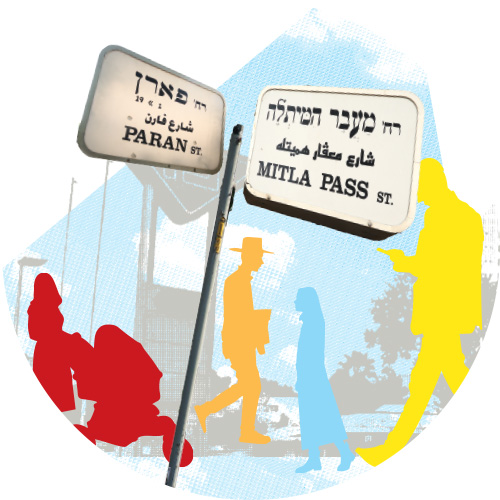Growth Curve: Chapter 2

“I always thought Fridays are the day off here in Eretz Yisrael, the day you go out with your husband after a whole week of learning”

Tziporah drained the last dregs of coffee in her “#1 CPA” mug and looked at her list. “Send PDFs of Katz 2021 taxes to Maury for review,” it said. She saved the PDFs, sent them out, and put a checkmark on the list. Next: “Complete extension requests for Hollander, Heimowitz, Feld.”
That was annoying busywork. Should she start now, or pick up Momo from the babysitter first and try to get him in for a nap at home, so she’d have a solid chunk of time to work before picking up Miriam and Yehuda from their after-school programs? She decided to go get Momo.
“Hi, Chavi, how’s it going?” she asked the babysitter.
“Great, but Momo just fell asleep about twenty minutes ago. I tried to keep him awake until pickup, but he was desperate for a nap. I hope this doesn’t ruin your day.”
“Nah, it’s fine,” Tziporah lied. She squeezed, then flexed her fingers. “Hopefully he’ll transfer to the stroller and keep sleeping there.”
Momo woke up, of course, when Tziporah lifted him out of the babysitter’s crib, but his eyelids fluttered closed soon after she strapped him into the stroller with his fuzzy gray blanket. The quick walk home finished the job, and he was fast asleep when she reached her building.
Standing in the entrance, she weighed her options. Should she risk waking him up again by switching him into his crib, or should she schlep the stroller up the three flights of stairs, and allow him to continue sleeping?
She needed the hour of quiet to work on those extension requests from the New York office — they usually expected her to have her to-do list completed by the time they logged in every morning. She decided to schlep the stroller up, and was midway up the first flight when she heard an unfamiliar voice.
“Hi, umm, do you need some help with that?”
That dark ponytail sheitel looked familiar. Where had she seen this girl?
“Thanks so much, that would be great,” Tziporah said. “I live on the third floor, so it’s two more flights.”
“No problem. I’m here on the first floor, we just moved in last week, and I’m happy to get some exercise.”
The girl grabbed the footrest of Momo’s stroller and Tziporah felt her load lighten.
“So you took the Cohens’ apartment?” she asked. “It’s a pretty one, right? I think it was renovated around two years ago — new floor, new kitchen, A/C in every room.”
“Yeah, it’s really pretty, we’re very happy with it,” the girl said as they heaved the stroller up together.
“Okay, here’s my apartment, thanks so much for your help. Wait,” Tziporah said suddenly. “I totally forgot to ask your name! I’m Tziporah, Tziporah Muller. We’ve been living here for five years. It’s a great building, and this is the nicest block in Ramat Eshkol. You have literally the best neighbors anyone could hope for.”
The girl smiled, and suddenly Tziporah knew why she looked familiar — she had almost spilled her iced coffee over Momo’s stroller last week, on Friday morning on Rechov Paran.
“My name’s Gitty Lederberg. Still getting used to it! Just got married between Purim and Pesach, I still think of myself as Gitty Klein.” She grinned.
“That’s cute, it does take time.” Tziporah opened the door to her apartment but didn’t step inside. “I was probably more mixed up than you when I got married… my maiden name is actually Weiss, but my father was niftar when I was twelve. My mother got remarried, and our family became Berger, and I was never sure what my last name should be. Tziporah Weiss? Tziporah Weiss-Berger? Tziporah Berger who used to be Weiss? It was a relief to get married and just be Tziporah Muller.”
“Yeah, I hear that. Not the same thing, obviously, but my parents moved from Boro Park to Toms River when I was in high school, and I’m still not sure where I’m from. Do I say Boro Park or Lakewood or originally-Boro-Park-but-now-Lakewood? How long did you say you’re here, five years? I wonder if I would have seen you around — I used to do chesed here in this neighborhood when I was in seminary. You know the Grossingers on Ramat Hagolan, so I was their chesed girl. I spent tons of afternoons in the Igloo Park, then took the kids out for ice cream in Katzefet on Paran, the cutest little people ever. I can’t believe I’m back.”
Tziporah remembered watching Gitty and her husband settling into their seats at the bagel shop. She definitely was back, back to spending money she hadn’t earned, back to living a life of leisure.
“It must be cute,” she said carefully, trying to keep any tart undertones of judgment out of her voice, “that now you’re back on Rechov Paran eating out, just this time with a husband instead of a bunch of chesed kids. And on Fridays instead of Thursdays.”
Gitty pressed her lips together. “Actually, I’m not sure it’s going to work out that way,” she said. The effervescence had drained away, and her voice was quiet. “I mean, I would love it, it’s totally my thing — I always thought Fridays are the day off here in Eretz Yisrael, the day you go out with your husband after a whole week of learning. But after seeing what goes on there, my husband signed up for this Friday kollel. He said too many people waste their Fridays, and he doesn’t see himself sitting at the bagel shop every week with random yapping young couples, not his type at all. So I guess I’m… adjusting.”
“Wow, that’s really impressive,” Tziporah said with genuine admiration. “Your husband must be really shtark.”
Gitty smiled wanly. “Right, it’s for sure impressive,” she said. “But…you know, I just got married less than two months ago. When I was in seminary, I saw all those couples talking, laughing, and couldn’t wait until it would be me. This wasn’t what I really imagined for my shanah rishonah.”
Momo shifted in the stroller, and his fuzzy blanket slipped to the floor.
Gitty grabbed it. “Here,” she said. “It was really nice meeting you, I’d better go now.” She fled down the stairs.
“Same here, and thanks a ton for your help with the stroller,” Tziporah called after her disappearing back.
***
“Perfect! That was great, thanks for explaining. Appreciate it.” Akiva was always polite.
“My pleasure,” Benny said. “The Rashbas here can be hard. It’s not the easiest sugya. That’s what I’m here for.”
“Actually I have another question, Reb Benny, but, umm, well, this might take more time.”
Benny tipped his shtender back up. “I’m happy to make time for you, Akiva,” he said, patting the seat next to his. “But maybe the beis medrash is not the right place? You tell me.”
“Yeah. I’d love somewhere quiet, without all the guys around.”
“So how about you meet me right after seder’s over and walk me home. We’ll talk as long as you need. Sounds good?”
Akiva nodded.
At 5:30, Benny felt his phone buzzing. It was Tziporah, which was strange, because she never called him during seder. He grabbed the phone and walked out of the beis medrash.
“Hi, Tzip, everything okay?”
“Umm, yeah, not really, I mean, can you come home?”
“What’s wrong, Tziporah?”
Tziporah sighed. “I think Yehuda needs stitches, he was doing some sort of jumping contest on the stairs with the Moskowitz kids, and he split open his chin. I tried all the regular stuff — you know, apply pressure, wait it out — but the cut is really big and deep, there’s blood all over the floor here. I think we’ll have to take him in.”
“All right, stay calm, I’ll be there soon.”
Benny went back into the beis medrash and closed his Gemara. He collected his hat and jacket and headed out.
Wait, there was something he’d forgotten. Akiva.
He went back in and tapped Akiva on the shoulder. “Hey, Akiva,” he said, “I’m sorry, but something came up at home. I need to leave. But I still want to talk to you, man. Call my cell after seder, if things are under control we’ll talk, if not we’ll find time later tonight.”
Akiva nodded. His shoulders looked stiff. Poor guy, that was a lot of tension he was holding in.
Benny slid his jacket over his shoulders and ran out.
***
“There was one problem. George was curious,” Benny intoned dramatically.
Yehuda giggled. Baruch Hashem, Tziporah had thought to pack up snacks, drinks, and Yehuda’s favorite books for the long wait.
“Here, Yehuda, turn the page, my hand is busy over here keeping your blood inside your chin,” Benny said, adjusting the wad of tissues he was holding against Yehuda. “Do you know what happens next? Does Curious George make a good decision, or not such a good one?”
“Not a good one!” Yehuda said. “Here, read it!”
“Curious George looked around and — wait a sec, Yehuda, my phone is ringing.”
Benny pulled his phone out of his pocket. It was Akiva.
“Here, Yehuda, look at the pictures, I need to talk to this guy,” Benny said. “Hey, Akiva, thanks for remembering to call, good hearing your voice, man. Yeah, it’s fine to talk now, I’m waiting for the doctor to stitch up my little guy’s chin, and it’s gonna be a long wait. You picked the perfect time.”
“Thanks, Reb Benny.” Akiva sounded so hesitant, Benny ached for him. “So, it goes like this. Umm, this isn’t a question about learning, right, okay. First I thought I’d talk to Ephraim Grossman, you know the first-seder shoel u’meishiv, they say he’s a smart guy, understands people and situations and all that.”
“For sure,” Benny said, gripping the phone tighter. Ephraim Grossman was definitely a smart guy.
“But then…” Another pause. “So I wasn’t sure he would like, relate to my question. He’s this regular button-down type from a perfect Lakewood family, everything by the book, straight yeshivish, you know? I figured you might get it more than he would.”
Benny felt a stab of satisfaction. “Hmm,” was all he said.
“So here’s the story,” Akiva said in a sudden rush. “So my parents, you know they’re divorced, right, and it’s not great between them. Usually it doesn’t matter so much, but now my sister — she lives here, in Efrat — had a baby, and they’re both planning to come for the bris. You know what that means for me, right?”
“It means you’re going to have to be the peacekeeper, huh,” Benny said.
“Yeah, exactly. She just had a baby, we can’t bother her, obviously. So my dad is going to want to spend some quality time with his kids, that leaves only me. And then my mom is going to want to spend some quality time with her kids, me again. And every time I go out for dinner with one, the other one feels all insulted and hurt. And the bris itself, and before and after and everything, it’s going to be full of tension. I’m supposed to the peacekeeper, like you said. And I can’t do it.”
Benny abandoned the wad of tissues he was holding and stood up.
“I hear you, man,” he said, pacing up the hallway. “Not an easy place to be. You know, it’s funny, my wife and I both come from interesting family situations. Her father died when she was twelve, my father walked out when I was ten. Death is for sure sadder — I mean, she never saw him since — but it’s cleaner, in a way. Divorce is messy. My dad wanted out of the marriage, but after a few years, he realized he didn’t want out of being a dad. He wanted to spend time with me and my brother. And we were confused and angry and upset. He had really hurt us, and hurt our mother, and shaken everything up.
“But what can I tell you?” Benny turned and paced back down the hall to the waiting area. “We got to a point where we were able to have a relationship again, and sort of separate between his issues with my mom and his desire to be a good father to us, and we make it work. My dad’s a good guy, he’s a generous person. And I chose to see that and appreciate it. Do you think that some of that might apply to your parents too? Do you think you can have a relationship with each one just as your parent, and shut out the rest of the picture, at least in the moment?”
“Hmmm,” Akiva said. “I need to think about that. I mean, I guess it’s true, my dad’s not a monster. He has issues with my mom, but he wants to be good to us kids.”
Benny felt an almost tangible ripple of satisfaction.
“But how does it play out?” Akiva pleaded. “Like, walk me through this. My dad calls, my mom calls, they both want a slice of me at the same time. How do I make it work without cutting myself into pieces?”
At the edge of his consciousness, Benny heard a ragged sobbing. Oh, no, it was Yehuda. He ran back to the bank of chairs. The wad of tissues was nowhere to be seen.
“Tatty, where were you?” Yehuda sobbed. “I was waiting and waiting, and then my chin started bleeding again, and I couldn’t hold the tissues anymore. And I didn’t see my Tatty and I was all alone and now Curious George is covered with blood.”
to be continued…
(Originally featured in Mishpacha, Issue 925)
Oops! We could not locate your form.



